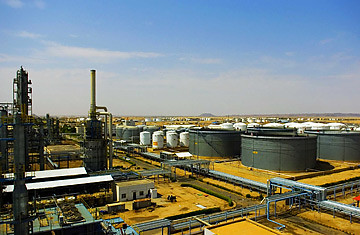
Sudan oil refinery where the newly-emerging oil-rich central African state has been under fire from U.S. imperialism for years. The leadership of the country is being hounded by the ICC which it is not a party to the Rome Statute., a photo by Pan-African News Wire File Photos on Flickr.
Institute for Security Studies
(Tshwane/Pretoria)
East Africa: Sudanese Oil Stalemate Persists
2 February 2012
analysis
Negotiations between Juba and Khartoum on the oil issue, under the auspices of the African Union's High-Level Implementation Panel (AUHIP), continued on the sidelines of the recently ended African Union meeting in Addis Ababa, Ethiopia.
This followed the collapse of negotiations between the two countries after South Sudan accused Sudan of stealing its oil whereas Sudan demanded more than $30 per barrel for the use of the oil infrastructure on its territory. However, the latest round of negotiations has not succeeded in breaking the deadlock between the two countries.
In the recent attempt to break the deadlock, the AUHIP laid two main options on the table. The first required the parties to agree a 30-day transition period during which the use of the infrastructure would continue whilst negotiations persist till a deal is arrived at by the two parties.
The second option was for South Sudan to pay an agreed amount to Sudan for the use of the oil infrastructure as well as loss of revenue resulting from the 2011 split. The latter appeared to have prevailed and Juba was required as per indicative guidelines to pay an estimated amount of about $4 billion to Sudan over a period of five years and 35 000 barrels of oil per day.
The figures are, however, indicative and actual amounts to be paid by South Sudan would have to be agreed upon conclusion of negotiations in 30 days. In addition to these, Juba will be required to stop the ongoing shut down of oil production.
Juba has, however, rejected the deal leading to another stalemate.
Justifying the decision of the government of South Sudan, President Salva Kiir cited issues of lack of clarity in several provisions and the fact that the solution does not comprehensively address the issues underlying the stalemate.
It is evident that if both sides keep shifting the post and reintroducing other issues, an agreement is unlikely to be reached anytime soon. With Sudan's economic indicators steadily declining, there will be a great deal of pressure on them to cede grounds in the negotiations.
However, South Sudan has diminished Khartoum's use of its monopoly of oil infrastructure in dictating the price for the use of the infrastructure and might be keen on going ahead with alternative routes through Kenya, as a long-term strategy.
The difficult nature of the oil negotiations indicates the difficulties that other contentious post-referendum issues may pose to the AUHIP-facilitated negotiation process. It might be better for the panel to start considering discussing many of these issues more comprehensively than the single-focused approach that the oil stalemate is pointing to.
The inherent interests in certain issues may facilitate getting stakeholders to cede some grounds on others thus giving a breakthrough on the post-referendum issues including oil.
No comments:
Post a Comment